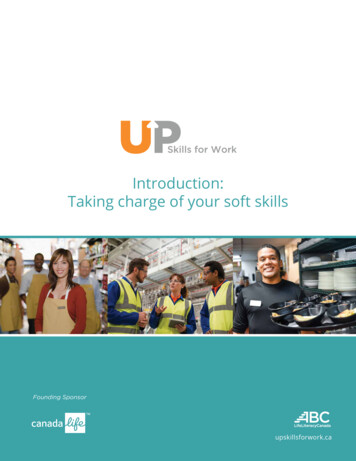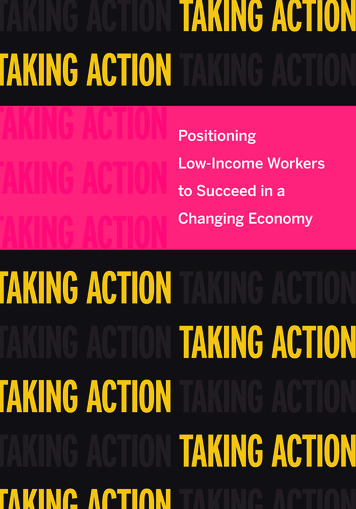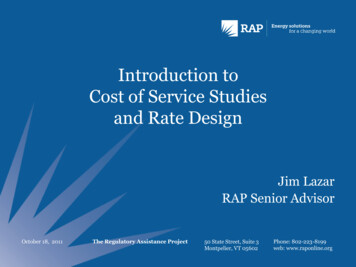
Transcription
Introduction:Taking charge of your soft skillsFounding Sponsorupskillsforwork.ca
Taking charge of your soft skillsWelcome to UP Skills for Work!The program helps you build your soft skills which include: motivation presentation adaptability attitude teamwork stress management accountability time management confidenceSoft skills are ways of acting or thinking thatmake it easier to work well with other people.Sometimes they’re called “people skills.”This workshopSoft skills help you work well with others—at work, at home,and in your community.In this workshop, we will explore 9 soft skills. We will talkabout: Why soft skills are important How soft skills relate to essential skills What it takes to improve your soft skills Some strategies for solving problems at workYou will also get a chance to go over your own soft skills.This program is delivered in collaboration with Futureworx.For more information on soft skills, check out futureworx.caThis project has been partly funded by the Government of Canadathrough the Adult Learning, Literacy and Essential Skills Program.upskillsforwork.ca
Taking charge of your soft skillsWhat skills do we need at work?Technical skillsThe skills needed for specifictasks at work. For example: Working with power tools Making an Excel spreadsheetEssential skillsSkills that are important forany type of job. For example: Oral communication Problem-solvingSoft skillsWays of acting and thinking thatmake it easier to work well withother people. For example: Teamwork Time managementIn this workbook and the rest of the UP Skills for Work program, we focuson soft skills.In the Skills Pyramid above, soft skills are at the bottom. You might saythey are the base for all other skills. In fact, many experts think that softskills are the most important skills for our success and well-being at work.In this workbook, we will talk about why that is.upskillsforwork.ca1
Taking charge of your soft skillsWhat are essential skills?Before we get into soft skills, let’s look at the skills in themiddle of the pyramid: essential skills.The Government of Canada has named 9 essential skills thatwe all need for work, for learning, and for life. You probablyuse at least some of these skills at work and at home everyday. Essential skills help us learn the technical skills we needon the job. They also help us grow in our career and adapt tochanges.As we learn more about soft skills, you will see how softskills are essential too. Through the UP Skills for Workprogram, we are also working on at least 4 of the 9 essentialskills: thinking, working with others, oral communication, andcontinuous learning.Essential skill2Workplace examplesOral communication:Talking, listening to, andunderstanding people. Understanding feedback Resolving conflicts Talking to customersWorking with others:Working and cooperating withother people to get the job done. Being part of a team Working on our ownalongside others Creating a positive workenvironmentThinking:Finding, understanding, andconsidering information. Getting organized aking decisions about trickyMsituations Coming up with new ideasContinuous learning:Gaining new skills andknowledge over time. Learning on the job aking training courses toTimprove our skills upskillsforwork.ca
Taking charge of your soft skillsChart continued from previous pageEssential skillWorkplace examplesNumeracy:Understanding and workingwith numbers, amounts, andmeasurement. Handling cash Estimating costs Placing ordersReading:Reading and understandingwritten information. Understanding writteninstructions, orders, e-mails,websites, and text messagesDocument use:Reading and understandinginformation and symbols indocuments. Adding informationto documents. Filling out an order form hecking labels on cleaningCproducts Creating a chart or a signWriting:Writing text and writing indocuments on paper, computers,and other devices. riting e-mails, letters,Wand reportsKeeping recordsAnswering requestsComputer use:Using computers and otherdigital technology. sing cash registers or otherUmachines that are run bycomputersUsing the internetWorking with spreadsheetsA place for your notes:upskillsforwork.ca3
Taking charge of your soft skillsWhat are soft skills?Think about the phrase soft skills. What comes to mind?Soft skills are ways of acting or thinking thatmake it easier to work well with other people.Sometimes they’re called “people skills.”In the UP Skills for Work program, we talk about 9 specific skillsthat we all use to manage ourselves and work well with others.We use these skills at work, at home, and in the community.Take a look at the 9 soft skill definitions and examples in thischart. Add in your own examples of how you use the 9 soft skillsat work.Soft skillMotivation:Wanting to do something.It can also mean wanting todo something really well.Workplace examples Doing your best even if no one is watching H aving high expectations of yourself atwork Write your own exampleAttitude:How you show people yourthoughts and feelings throughyour words and actions. B eing respectful and friendly with coworkers, supervisors, and customers B ody language and tone of voice that showyou care about doing your job well Accountability:Owning your actions, boththe good and the bad. T aking responsibility for the quality of yourwork A dmitting when you make a mistake, andfixing it 4upskillsforwork.ca
Taking charge of your soft skillsChart continued from previous pageSoft skillPresentation:How you look and soundto other people.Teamwork:Working well with otherpeople. It’s also abouttreating people kindly.Timemanagement:Making decisions abouthow you spend your time.Adaptability:How you react to change.Workplace examples Using language that is right for your workplace D ressing in a way that is right for yourworkplace Helping other people when they need it R esolving conflicts with co-workers in arespectful way Following schedules and meeting deadlines F ocusing on your work and getting tasksdone on time Being positive about workplace changes B eing ready and able to learn new skills andnew ways of doing things Stressmanagement:How you let stress affectyour work, life, andrelationships.Confidence:Believing in yourself—inwhat you can do now, andin what you can learn to dotomorrow.upskillsforwork.ca D oing what you can to limit how stress isaffecting you, your work, and your co-workers K nowing how to ask for help when you areoverwhelmed B elieving in yourself when you have to dealwith challenges and new situations S haring new ideas and speaking up foryourself when you need to 5
Taking charge of your soft skillsLet’s talk about it hich of the 9 soft skills are most important for you atWwork? At home? o you use your soft skills differently when you’re atDwork than when you’re at home? How? Are there any skills you’d like to add to the list? e all learn our soft skills somewhere. Where did youWlearn your soft skills? Who did you learn them from? et’s be honest: it can feel uncomfortable to talk aboutLour soft skills. Why do you think that is?A place for your notes:6upskillsforwork.ca
Taking charge of your soft skillsSoft skills look different for everyoneWe all use soft skills every day, whether we realize it or not.At first it might seem like soft skills are just part of yourpersonality. But that’s not really true.Your personality can affect the way you use your soft skills.Two people with different personalities might have differentways of communicating. For example, someone who is moreshy might show their teamwork skills in a different way thansomeone who is more outgoing. Both people could be greatteam players, even if they had different strategies for showingit. No matter how you choose to show them, soft skills aresomething you can learn and work on.Use the table below to write down a couple examples for thetwo types of personalities we just talked about. How do youthink they would show their teamwork skills differently atwork? More shy More outgoingGood teamworklooks like thisGood teamworksounds like thisupskillsforwork.ca7
Taking charge of your soft skillsSoft skills and personal leadershipWhen you think of a “good leader,” who comes to mind?What are their qualities?We usually think of leadership as leading other people.We can also be good leaders to ourselves. Making the most ofsoft skills means being good leaders to ourselves, or showingpersonal leadership.Personal leadership is about how we manage ourselves,including: Our behaviour Our goals and the direction we want to take in our career How we work to be our best in all parts of our life(home, work, community)We can show personal leadership in many different ways.For example: Understanding our strengths and our weaknesses Enjoying when we succeed Looking for ways to improve Sticking to a plan Being kind to ourselves Knowing how and when to ask for help Learning from all kinds of experiencesWhat are some other ways we can show personal leadership? Let’s talk about it8 What does personal leadership mean to you? hat are some ways that you try to be a good leaderWto yourself? o you think good personal leadership can make aDdifference at work? How?upskillsforwork.ca
Taking charge of your soft skillsHow can soft skills make a difference?No matter what technical skills you have, soft skills make adifference. Soft skills help us: Solve problems and get along with people Learn new skills and deal with changes Make the best use of our technical skillsMeet AmaniAmani is a cleaner in an office building. When she getsto work, the boss looks at the clock. “Ten minutes early,like always,” he says. Amani says hello to her co-workers.Everyone has a smile for her because she’s so friendly.Later that night, Amani and her co-worker Jasmine arecleaning an office together. Jasmine watches Amanivacuuming the hallway for the second time. She thinks,Amani cleans carefully, but she’s not the fastest cleaner onthe team. “Are you almost done?” Jasmine asks, “We stillhave two more floors to finish.” “Yeah, I’m almost done,”says Amani. “Here, let me help you with the garbage.”Let’s talk about it Would you want to work with Amani? Why or why not? hich soft skills do you think Amani is good at? WhichWones could she improve? o you think Amani’s soft skills are making a differenceDfor her at work? How?A place for your notes:upskillsforwork.ca9
Taking charge of your soft skillsSoft skills in actionMeet Sarah and MiguelSarah and Miguel work at the same store. They are bothcashiers who serve customers quickly. One day the storehas a big holiday sale. It is much busier than usual.At 9:30 am the checkout lines are already really long.Customers are getting frustrated.Sarah looks at the long line of shoppers and groans. Thisis going to be an awful day, she thinks. The customers areall going to blame me for the long waits. When customerscome to her station, she’s afraid to look them in the eye.Miguel looks at his long line and thinks, Wow! Lots ofpeople! Oh well. I just have to focus more today. He takesa deep breath. He smiles at the next customer. “Busy daytoday! I’m sorry about the long lines. I’ll help you asquickly as I can.”At the end of the shift, the store manager thanks the stafffor their hard work. She comes over to Miguel’s station.“Your work was especially good today,” she says.Let’s talk about it10 ow did Miguel use his soft skills to deal with thisHsituation? How do you think his approach affectedhis day at work? How do you think it affected his coworkers? His boss? hat was different about Sarah’s way of dealing withWthe situation? ave you ever been in a situation like this as a customer?HHow do you think Miguel’s approach affected hiscustomers? What about Sarah’s approach? ave you ever been in a situation like this at work?HHow did you deal with it?upskillsforwork.ca
Taking charge of your soft skillsMy Soft SkillsNow it’s time to think about your own soft skills. Thesequestions are about how you use your soft skills in a worksituation. Try to be honest with yourself here! It will helpyou see what your strengths are, and where you can improve.Where are you starting from?Read each statement and rate yourself for each one.1 – rarely true2 – sometimes true3 – usually trueWhen I go to work, I really want to do my best.123I know how to present myself. I make a good impression on people.123I adapt well to change. I don’t get stressed out when things change.123I try to keep a positive attitude, even when things are hard.123I’m a team player. I like working with other people and helping myco-workers.123I handle stress pretty well. When I start feeling stressed, I knowhow to deal with it.123I take responsibility for my work. If I make a mistake, I admit to it.I also try to fix what went wrong.123I know how to use my time well. I get my work done in the time Ihave to do it. When things are slow, I find something to do.123I am a confident person. When something needs to be done at work,I believe that I will do it well.123If you have time, repeat the exercise: think about how othe peoplewould rate your skills (for example, your boss, or your friends).Do you think they would rate you the same, or differently? Why?upskillsforwork.ca11
Taking charge of your soft skillsMaking a change: Supports and barriersSo far, we’ve focused on you. But when it comes to making apositive change, you are not alone. Sometimes the first step islooking at your environment: where you are and what’s aroundyou. In every environment, we find supports as well as barriers.Supports are the things that make it easier for us toget what we need, make changes when we want to,and reach our goals.Barriers are the things that make it harder for us toget what we need, make changes when we want to,and reach our goals.Supports and barriers come in many different forms.For example: The people around us Our life experiences Our financial situation ervices we can use in our community (like taking theSbus or going to the doctor) The place where we live, and the society that we live inLet’s talk about itLet’s talk about a workplace environment. At work, what kindsof supports might help you succeed? What kinds of barriersmight hold you back?A place for your notes:12upskillsforwork.ca
Taking charge of your soft skillsWhat do you need to grow your soft skills?Improving your soft skills at work is a bit like growing aplant. You can plant a seed. But what if there is poor soil, or toomany weeds, or not enough rain? These things can make it hardfor your plant to grow (barriers).You can’t always control the soil or the weather. But you cantake action or get help to make it easier for your plant to grow(supports). You can pull out the weeds. You can ask a friend orsearch online to learn how to make the soil better. You can wateryour plant on the days that it doesn’t rain.Look at the image below. Think about these questions: hink of the growing plant as one of your soft skills.TWhat is one soft skill you would like to improve at work? hink of the sun, the water, and the soil as supports thatTcan help you change your soft skill. What supports do youneed at work to make this change?If you like, write some notes, or add your ideas to the image.You can also think about barriersto making this change at work.What might hold you back?upskillsforwork.ca13
Taking charge of your soft skillsStrategies for setbacks: Problem-solvingSometimes, when we are trying to make a change or learnsomething new, it is hard to know where to start. Problemsolving is a tool that can help.Think back to the 9 soft skills and the 9 essential skills welearned about earlier. When we’re solving problems, we’rebringing many of these skills together.You can use this problem-solving guide in different situations:üü Learning a new skillüü Dealing with an issue at worküü Thinking through a personal problemüü Doing activities in this workshop seriesTry these steps:Step 1Step 2Step 314Identify the problem: How does it affect you? What are the causes of the problem? re other people involved? If so, how might theyAview the problem differently than you?What are the barriers? What might stop you from solving this problem? How can you deal with those barriers?What are the supports? hat knowledge or skills do you have that canWhelp you solve the problem? Who can help you?upskillsforwork.ca
Taking charge of your soft skillsStep 4Step 5Step 6Think about different possible solutions: What do you need? What do the other people involved need? What would be your ideal solution? What solution might other people want? hink of some solutions that you could live with even if they areTnot ideal.Pick a solution. List 3 or 4 possible actions to make it happen: Consider the pros and cons of each possible action. Talk about your ideas with a friend or family member. Which idea is best? Which idea is most realistic?Pick an action and make a plan: Is there anyone you need to talk to about your plan? Do you need more information to make sure your plan works? Do you need help from anyone to support your plan?Step 7Take action. Follow through with your plan.Step 8Reflect: Did you solve the problem? If not, what didn’t work this time? onsider going back to step 4 and trying another possibleCsolution.Remember: ou don’t have to solve the problem right away.YFollowing these steps shows you one way to getstarted. But sometimes, solving a problem takestime, and more than one try.upskillsforwork.ca15
Taking charge of your soft skillsPracticing what we learned: Problem-solvingWe can use problem-solving steps to deal with real workplaceissues. Here are 3 stories about people dealing with challengingsituations at work. Pick one of the stories to read. Use theproblem-solving steps we learned on the previous page: thinkabout how the people in the story could resolve the issue.Think about: What is the core problem? What are the barriers that make it hard to solve the problem? What are some possible solutions? hat are some supports that could help the people involvedWsolve the problem?Meet Jordan and AlexJordan and Alex are both cooks in a hotel kitchen. Jordan worksthe day shift and Alex works the evening shift. They work atthe same station, and they see each other briefly each day whenAlex arrives at work. Alex thinks Jordan should do a better jobof cleaning up when her shift is over. Jordan thinks Alex is toopushy and a bit of a bully. The tension between them keepsgetting worse.Meet TaniaTania likes her job stocking shelves at a big store. But she’s notmaking enough money. She needs more hours. She has talkedto her boss about it a few times, but she still isn’t getting moreshifts. Tania thinks, I like working here. But if I can’t get morethan 20 hours a week, I’ll have to find a new job.16upskillsforwork.ca
Taking charge of your soft skillsMeet Steve and RajSteve works in a warehouse. He likes to stick to the rules.But his co-worker Raj always wants to bend the rules. Healways wants the group to take 5 extra minutes at breaktime. And he tries to get people to goof off and waste time.Steve is worried that the boss might get angry with thewhole group. But he doesn’t want to tell the boss aboutRaj’s behaviour. Raj is a nice guy and Steve doesn’t wantto get him into trouble. But he keeps getting more and moreuncomfortable with the situation.A place for your notes:upskillsforwork.ca17
Taking charge of your soft skillsCongratulations!You have completed the UP Skills for Work Introductionworkbook and taken the first step toward building yoursoft skills.The UP Skills for Work program offers other workshops.There is one about each of the 9 soft skills. These workshopsgive you the chance to dig deeper into the soft skills you’dlike to work on.We hope you’re inspired to think about your soft skills andparticipate in future workshops.Remember, people are always growing and learning. We canalways improve our soft skills— both the ones we’d like tochange, and the ones we already feel confident about.Wrapping upHow did you feel about this workshop?What was it like to think about your soft skills? Did anythingsurprise you?What is the most useful thing you learned in this workshop?18upskillsforwork.ca
Before we get into soft skills, let's look at the skills in the middle of the pyramid: essential skills. The Government of Canada has named 9 essential skills that we all need for work, for learning, and for life. You probably . use at least some of these skills at work and at home every day. Essential skills help us learn the technical .











